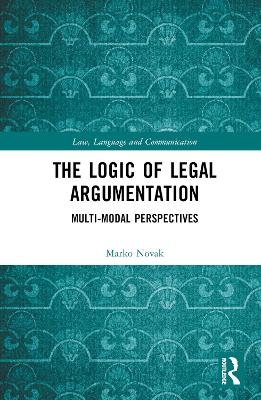
The Logic of Legal Argumentation
Multi-Modal Perspectives
Seiten
2024
Routledge (Verlag)
978-1-032-55784-7 (ISBN)
Routledge (Verlag)
978-1-032-55784-7 (ISBN)
Multi-modal argumentation with its logical, emotional, visceral and kisceral arguments is an important addition to logical argumentation, especially when real-life situations are considered. It does not discard logic but adds other modes of argumentation to complement it, to emphasize the realistic environments of communication. In this sense, the multi-modal theory is important for the area of legal argumentation, where even in the reasoning of judicial decisions traces of a flesh-and-blood personality, who decided the case and wrote the reasons, can be found.
This book presents a comprehensive analysis of this informal logic in legal argumentation and its practicality within the law. It argues that by building on the dialectical and rhetorical models of legal argument, the former being important for clear cases while the latter for unclear ones, the multi-modal theory of legal argumentation brings together logic and psychology in a holistic or integral perspective. The approach is not only descriptive, identifying the traces of alternate arguments in judicial decisions, but is also normative, presenting the criteria for evaluation that multi-modal arguments need to face to attain validity in the legal context.
The work will be of interest to academics and researchers in the areas of Legal Theory, Legal Linguistics, Philosophy of Law, and Communication Studies.
This book presents a comprehensive analysis of this informal logic in legal argumentation and its practicality within the law. It argues that by building on the dialectical and rhetorical models of legal argument, the former being important for clear cases while the latter for unclear ones, the multi-modal theory of legal argumentation brings together logic and psychology in a holistic or integral perspective. The approach is not only descriptive, identifying the traces of alternate arguments in judicial decisions, but is also normative, presenting the criteria for evaluation that multi-modal arguments need to face to attain validity in the legal context.
The work will be of interest to academics and researchers in the areas of Legal Theory, Legal Linguistics, Philosophy of Law, and Communication Studies.
Marko Novak is Professor of Law in the European Faculty of Law at New University and Management and Law College (MLC) Ljubljana, Slovenia.
Introduction; 1. Gilbert’s Multi-Modal Argumentation, Jung’s Psychological Typology, and the Extent of Multi-Modality to Law; 2. Multi-Modal Arguments in Judicial Decisions; 3. Visual as Multi-Modal Argumentation in Law; 4. Kisceral Argumentation in Law: Between Past and Present; 5. Emotional Argumentation, Law, and ADR; 6. The Legal Appraisal of Multi-Modal Arguments; 7. Multimodal Legal Argumentation in EU Trademark Disputes; Conclusion
| Erscheinungsdatum | 28.02.2024 |
|---|---|
| Reihe/Serie | Law, Language and Communication |
| Zusatzinfo | 3 Tables, black and white |
| Verlagsort | London |
| Sprache | englisch |
| Maße | 156 x 234 mm |
| Gewicht | 489 g |
| Themenwelt | Geisteswissenschaften ► Philosophie ► Logik |
| Geisteswissenschaften ► Philosophie ► Sprachphilosophie | |
| Geisteswissenschaften ► Sprach- / Literaturwissenschaft ► Anglistik / Amerikanistik | |
| Geisteswissenschaften ► Sprach- / Literaturwissenschaft ► Literaturwissenschaft | |
| Recht / Steuern ► Allgemeines / Lexika | |
| Recht / Steuern ► EU / Internationales Recht | |
| ISBN-10 | 1-032-55784-2 / 1032557842 |
| ISBN-13 | 978-1-032-55784-7 / 9781032557847 |
| Zustand | Neuware |
| Informationen gemäß Produktsicherheitsverordnung (GPSR) | |
| Haben Sie eine Frage zum Produkt? |
Mehr entdecken
aus dem Bereich
aus dem Bereich
ein Gegenentwurf zum kurzfristigen Denken : so werden wir zu den …
Buch | Hardcover (2023)
REDLINE (Verlag)
CHF 27,90


